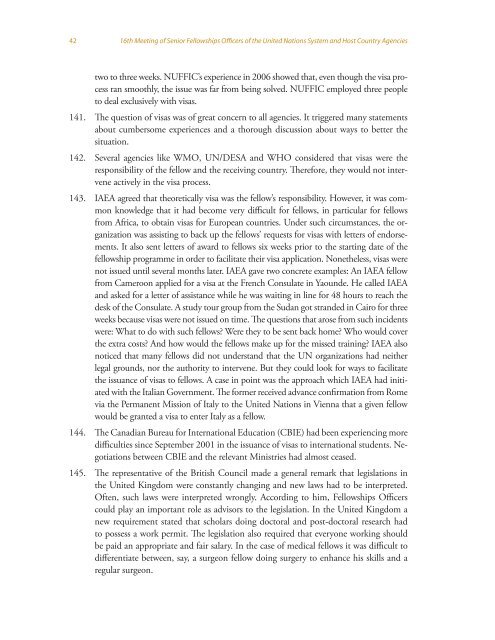16th Meeting of Senior Fellowships Officers of the ... - Development
16th Meeting of Senior Fellowships Officers of the ... - Development
16th Meeting of Senior Fellowships Officers of the ... - Development
You also want an ePaper? Increase the reach of your titles
YUMPU automatically turns print PDFs into web optimized ePapers that Google loves.
42<br />
<strong>16th</strong> <strong>Meeting</strong> <strong>of</strong> <strong>Senior</strong> <strong>Fellowships</strong> <strong>Officers</strong> <strong>of</strong> <strong>the</strong> United Nations System and Host Country Agencies<br />
two to three weeks. NUFFIC’s experience in 2006 showed that, even though <strong>the</strong> visa process<br />
ran smoothly, <strong>the</strong> issue was far from being solved. NUFFIC employed three people<br />
to deal exclusively with visas.<br />
141. The question <strong>of</strong> visas was <strong>of</strong> great concern to all agencies. It triggered many statements<br />
about cumbersome experiences and a thorough discussion about ways to better <strong>the</strong><br />
situation.<br />
142. Several agencies like WMO, UN/DESA and WHO considered that visas were <strong>the</strong><br />
responsibility <strong>of</strong> <strong>the</strong> fellow and <strong>the</strong> receiving country. Therefore, <strong>the</strong>y would not intervene<br />
actively in <strong>the</strong> visa process.<br />
143. IAEA agreed that <strong>the</strong>oretically visa was <strong>the</strong> fellow’s responsibility. However, it was common<br />
knowledge that it had become very difficult for fellows, in particular for fellows<br />
from Africa, to obtain visas for European countries. Under such circumstances, <strong>the</strong> organization<br />
was assisting to back up <strong>the</strong> fellows’ requests for visas with letters <strong>of</strong> endorsements.<br />
It also sent letters <strong>of</strong> award to fellows six weeks prior to <strong>the</strong> starting date <strong>of</strong> <strong>the</strong><br />
fellowship programme in order to facilitate <strong>the</strong>ir visa application. None<strong>the</strong>less, visas were<br />
not issued until several months later. IAEA gave two concrete examples: An IAEA fellow<br />
from Cameroon applied for a visa at <strong>the</strong> French Consulate in Yaounde. He called IAEA<br />
and asked for a letter <strong>of</strong> assistance while he was waiting in line for 48 hours to reach <strong>the</strong><br />
desk <strong>of</strong> <strong>the</strong> Consulate. A study tour group from <strong>the</strong> Sudan got stranded in Cairo for three<br />
weeks because visas were not issued on time. The questions that arose from such incidents<br />
were: What to do with such fellows? Were <strong>the</strong>y to be sent back home? Who would cover<br />
<strong>the</strong> extra costs? And how would <strong>the</strong> fellows make up for <strong>the</strong> missed training? IAEA also<br />
noticed that many fellows did not understand that <strong>the</strong> UN organizations had nei<strong>the</strong>r<br />
legal grounds, nor <strong>the</strong> authority to intervene. But <strong>the</strong>y could look for ways to facilitate<br />
<strong>the</strong> issuance <strong>of</strong> visas to fellows. A case in point was <strong>the</strong> approach which IAEA had initiated<br />
with <strong>the</strong> Italian Government. The former received advance confirmation from Rome<br />
via <strong>the</strong> Permanent Mission <strong>of</strong> Italy to <strong>the</strong> United Nations in Vienna that a given fellow<br />
would be granted a visa to enter Italy as a fellow.<br />
144. The Canadian Bureau for International Education (CBIE) had been experiencing more<br />
difficulties since September 2001 in <strong>the</strong> issuance <strong>of</strong> visas to international students. Negotiations<br />
between CBIE and <strong>the</strong> relevant Ministries had almost ceased.<br />
145. The representative <strong>of</strong> <strong>the</strong> British Council made a general remark that legislations in<br />
<strong>the</strong> United Kingdom were constantly changing and new laws had to be interpreted.<br />
Often, such laws were interpreted wrongly. According to him, <strong>Fellowships</strong> <strong>Officers</strong><br />
could play an important role as advisors to <strong>the</strong> legislation. In <strong>the</strong> United Kingdom a<br />
new requirement stated that scholars doing doctoral and post-doctoral research had<br />
to possess a work permit. The legislation also required that everyone working should<br />
be paid an appropriate and fair salary. In <strong>the</strong> case <strong>of</strong> medical fellows it was difficult to<br />
differentiate between, say, a surgeon fellow doing surgery to enhance his skills and a<br />
regular surgeon.

















